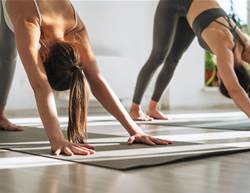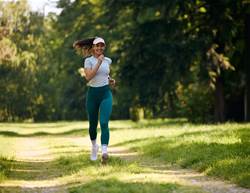"Running is always hard for me."
By my mid-50s, I was achy and stiff every time I stood up from my desk. If I exerted myself at all, I'd frequently strain a muscle. I took anti-inflammatory non-steroidal medication around the clock.
In 2014, when I was 56, I met with a personal trainer who explained that what I did in the gym would have a real, positive impact on my life. His enthusiasm was contagious. I began walking on the treadmill three kilometres each day.
One morning, late for work, I thought, "I'll make this machine go faster." Before I knew it, I was jogging—and my body didn't fall apart.
Doing my first run outdoors, I worried I'd hurt myself. I didn't have beautiful running form and wasn't comfortable wearing skimpy running clothes. I had the hardest time getting to one kilometre, then two. My cousin had told me that if I could push myself to five kilometres, I'd be okay—and I was.
My first goal was running a 10K that fall with my daughter. It was the hardest thing I've ever done. Next came a half-marathon in the spring. "You know what the next goal is, right?" my trainer asked. I had no idea. "A marathon," he said.
I signed up for the Reggae Marathon in Jamaica for December 2015, as well as a 20-week training plan. Every week, I spoke to a coach, who scheduled my runs according to my progress. I was doing great until three weeks before the marathon. During a run where I was going faster than usual, I felt a loud "pop" in my left leg and fell to the ground: I'd torn my hamstring. Even after physical therapy four times a week, I worried I wouldn't be able to finish the marathon. By November, I'd only worked back up to 5 kilometres.
Determined not to quit, I headed to Jamaica with my family in December as planned. The start time for the marathon was early morning. It was still dark. Hand-held torches lined the start and a steel band played calypso music. It was a beautiful moment. Throughout the race, I kept thinking, "Just get to the next water station!" My husband and daughter turned up along the route to cheer me on. With the heat and my fear that I'd re-injure my hamstring, it took me 7 hours, 13 minutes and 21 seconds. My legs were so heavy and my body was done. But I enjoyed every minute.
I've since finished 10 half-marathons and a triathlon and am training for my second marathon. I have a regular running partner and a group of women I run with at the high school track near my home. When I travel, I look for a local running group I can join or sign up for short races.
Running remains hard for me—but maybe that's why I get such a sense of accomplishment when I cross the finish line.
—Carolee Walker, 59, author of This Is My Brain on Endorphins: How I Got Fit, Healthier, And Happier (And You Can, Too), out in November 2017
"Running transformed my life."
Growing up, I was the quintessential wimpy kid. I couldn't hit a baseball, couldn't throw a football, hated dodge ball. I was bullied because of my lack of athletic ability, called a whimp—and worse—and beaten up.
That trauma stayed with me into adulthood and made me shy away from trying anything remotely athletic. I didn't want to face that shame and humiliation again.
Then, in 2010, when I was 57, I lost my father, mother, and mother-in-law, and sank into a deep depression. I knew I had to do something, so I finally gave in to the prodding of my best friend and business partner, who's 22 years younger than me and a lifelong runner. He had been after me for years to start running.
On my first pathetic 3-km run with Jared, I huffed and puffed and wheezed. But I made it back to my house on my own two feet… and felt pretty good. That was the start of a new day for me.
Jared and I began running three days a week. We held each other accountable and didn't let the other one bail on a run—even in the winter when temperatures were in single digits.
Between September and December of that year, I ran three 5Ks. In February 2011, I ran my first 10K and that spring, about one year after that very first run, I finished a half-marathon. My first full marathon was in Atlantic City in 2012. (There was a method to my madness. The course is flat!) My goal was to finish in 5 hours. I crossed the finish line in 4:48.
I've since run two more marathons and two ultra-marathons, which are races of 80+ kms. Yes, it's grueling to be on your feet for 24 hours, especially when you're in your 60s! But the satisfaction of doing it is second to none.
I know now that I am an athlete.
—Tom Ingrassia, 64
"A marathon isn't only about running."
In 2015, a month before I turned 60, I attended a self-improvement workshop. The speaker urged us to do something outside our comfort zone. One of the examples he gave? Running a marathon.
Soon after, I flew to New York City to support my daughter, who was running in the marathon there. When I saw a woman wearing a t-shirt that read, "I'm 60 and this is my first marathon," I thought, "I could do this too.
I'd never run before. On my first try that summer, it took me 17 minutes to go a mile. My husband, Karl, and I own a farm, so it was also tough to find time to train. I started getting up earlier in the morning, and laundry sat on the couch longer than it should have. Karl took on extra chores. Having a running buddy wasn't convenient. Instead, I ran with my dog—and sometimes my pony.
Once my runs became longer, I didn't feel comfortable running on the narrow county roads that surrounded our farm. I worried I wouldn't get out of the way of trucks in time. Instead, I had Karl drive me to other towns and I'd run home on the shoulder of larger roads. It was a great training strategy: If you get dropped 30 kilometres away, you have to get home somehow!
It was surprising how many people tried to talk me out of training. Well-intentioned family and friends said, "You don't have to do this," and "You're going to hurt yourself!" It would have been easy to agree with them and do nothing. Instead, I finished the New York City Marathon last year in 6 hours and 19 minutes.
During the race, I wasn't so focused on my time as the community around me. I listened to the bands playing. I danced. I talked to runners older than me or with debilitating injuries. I made friends. Running 26.2 miles isn't the most important part of running a marathon. It's deciding that you're worth it.
"Did you win?" my grandkids asked when I crossed the finish line that day. And I said, "Yes! I did."
—Nancy Falster, 62










